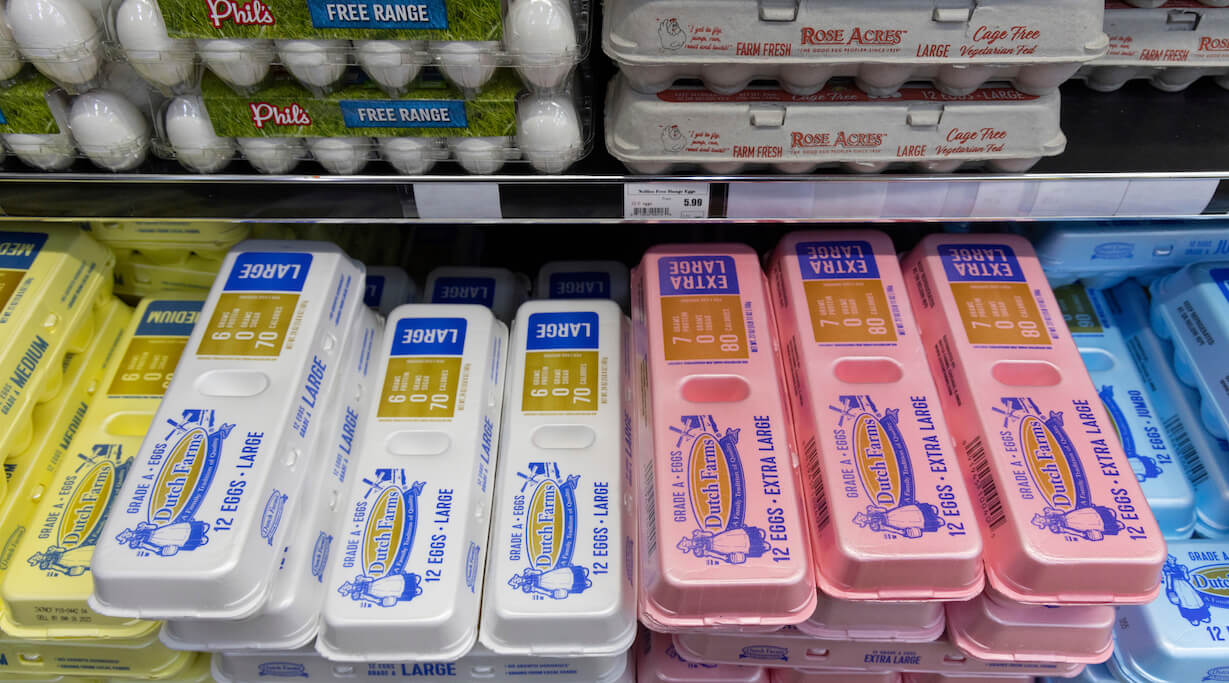
Cartons of eggs are on display at HarvesTime Foods on Thursday, Jan. 5, 2023 in Chicago. (AP Photo/Teresa Crawford)
The egg prices are too damn high. And perhaps there’s something more than just a deadly bird flu to blame.
High egg prices were even addressed by Rep. Ashley Hinson at a recent town hall in Grundy Center, who brought it up unprompted when talking about her two sons, ages 10 and 11, who she said were “about to eat me out of house and home.”
“My son had five eggs last Sunday, and I about had an attack, ’cause I thought, ‘Oh my gosh, like, he just ate $4 worth of eggs,'” Hinson told the crowd.
Egg prices aren’t quite that high—a dozen Grade A large eggs costs an average of $4.82 across the US as of Feb. 14. But prices for eggs have indeed been on the rise, and have particularly skyrocketed since September, when the average price was $2.90 per dozen.
The bird flu theory
The avian influenza outbreak, which began circulating last year, is certainly a major disrupter of the egg industry.
If the virus is found in a flock of domestic poultry, even in just one bird out of millions, the US Dept. of Agriculture requires the entire flock to be immediately killed “to protect our nation’s flocks and economy.”
Over 58 million wild and domestic birds in 47 states have been killed since last January. That includes 31 commercial flocks in 18 Iowa counties.
But while just eight of Iowa’s 31 mass kills were in the egg industry, they accounted for the vast majority of birds—more than 15.1 million out of 15.9 million were egg-related. Just two of those flocks alone accounted for the killing of more than 5 million egg-laying hens each.
Those huge flocks contribute to making avian influenza a bigger problem than it should be. But that’s not why prices are rising, said rural advocate and State Rep. J.D. Scholten (D-Sioux City).
“This is a classic example of market concentration,” Scholten said. “And consumers are paying the cost.”
The monopoly theory
Market concentration, also known as monopolization, has accelerated in a wide variety of industries in recent decades, with little pushback from federal agencies designed to prevent it.
Nowhere is that more pronounced than the agriculture industry: Just four large corporations control 85% of beef packing, 66% of pork and 54% of poultry, leading to prices for meat going up while farmers make less.
While eggs in particular are less consolidated, one company, Cal-Maine, still controls 20% of the egg market alone, or around 47 million egg-laying hens.
“In ag, the culture is, ‘get big or get out,'” Scholten said.
And while the egg companies claim avian flu is the reason for drastically higher prices, “its actual impact on the egg supply was minimal,” said farmer advocacy organization Farm Action in a letter to Federal Trade Commission Chair Lina Khan this week.
Data showed most of the avian flu kills—which were not insignificant, killing 43 million birds—dropped dramatically after June, flock sizes experienced at most a drop of 8% overall, and hens actually overproduced eggs last year, leading to “no substantial decline in 2022 compared to 2021,” Farm Action said.
Inflation played a role: Production and feed costs were 22% higher in 2022 than in 2021, Cal-Maine told investors. Yet the company’s gross profits far surpassed that, increasing tenfold in 2022—from just over $50 million in mid-2022 to more than $535 million by the end of November—the same time as egg prices were rising.
And in the fall of 2022, when egg prices were rising the fastest, Cal-Maine reported no positive avian flu tests on any of its farms.
“Cal-Maine’s willingness to increase its prices—and profit margins—to such unprecedented levels suggests foul play,” Farm Action wrote. “Contrary to industry narratives, the increase in the price of eggs has not been an ‘Act of God’—it has been simple profiteering.”
The solutions
The Khan-led FTC could and might investigate Cal-Maine for anti-trust violations, as Farm Action and at least one US senator is advocating.
But other agencies need to come on board as well, including investigations by the US Dept. of Agriculture and prosecutions if needed by the Department of Justice, Scholten argued.
“The antitrust portion of this is, on many, many levels, the first step in solving this,” he said.
He also argued for federal legislation to “de-incentivize” companies merging into monopolies, suggesting fewer subsidies or tax breaks on larger industry players.
More and smaller companies would mean smaller flock sizes, increasing animal welfare and competition in the marketplace, and providing more opportunities for small farmers.
“When we have just a few corporations dictating everything, the farmers get screwed, the workers get screwed, and the consumers get screwed, while they rake in record profits,” Scholten said.
by Amie Rivers
2/17/23
If you enjoy stories like these, make sure to sign up for Iowa Starting Line’s main newsletter and/or our working class-focused Worker’s Almanac newsletter.
Have a story idea for me? Email [email protected], or find me on Twitter, TikTok, Mastodon, Post, Instagram and Facebook.
Iowa Starting Line is part of an independent news network and focuses on how state and national decisions impact Iowans’ daily lives. We rely on your financial support to keep our stories free for all to read. Find ISL on TikTok, Instagram, Facebook and Twitter.
Support Our Cause
Thank you for taking the time to read our work. Before you go, we hope you'll consider supporting our values-driven journalism, which has always strived to make clear what's really at stake for Iowans and our future.
Since day one, our goal here at Iowa Starting Line has always been to empower people across the state with fact-based news and information. We believe that when people are armed with knowledge about what's happening in their local, state, and federal governments—including who is working on their behalf and who is actively trying to block efforts aimed at improving the daily lives of Iowan families—they will be inspired to become civically engaged.


Iowa Republicans make outlawing gay marriage key 2024 campaign priority
Iowa Republicans have made outlawing gay marriage a key goal in their 2024 party platform. During the Iowa GOP’s 2024 state convention on Saturday,...

Department of Justice says Iowa immigration law violates US Constitution
If Iowa doesn’t suspend the enforcement of its new immigration law by May 7, the state could face a federal lawsuit, according to the Des Moines...

Rushing: Iowa State president said the quiet part out loud
I want to thank Iowa State University President Wendy Wintersteen for doing us all a favor by finally saying the quiet part out loud: all the...

Iowa sets aside almost $180 million for year two of voucher program
Iowa has committed nearly $180 million in taxpayer funds to support private school tuition in the 2024-25 school year, which is almost $50 million...

Kalbach: Immediate action needed on corporate ag pollution
Iowa agriculture has undergone substantial changes over the past 40 years. We see it all around us. Rather than crops and livestock being raised on...

VIDEO: Jochum calls Gov. Reynolds’ summer meal program a ‘hunger game’
Iowa Gov. Reynolds announced a competitive $900,000 grant program to feed Iowa children over the summer, months after she declined $29 million in...





